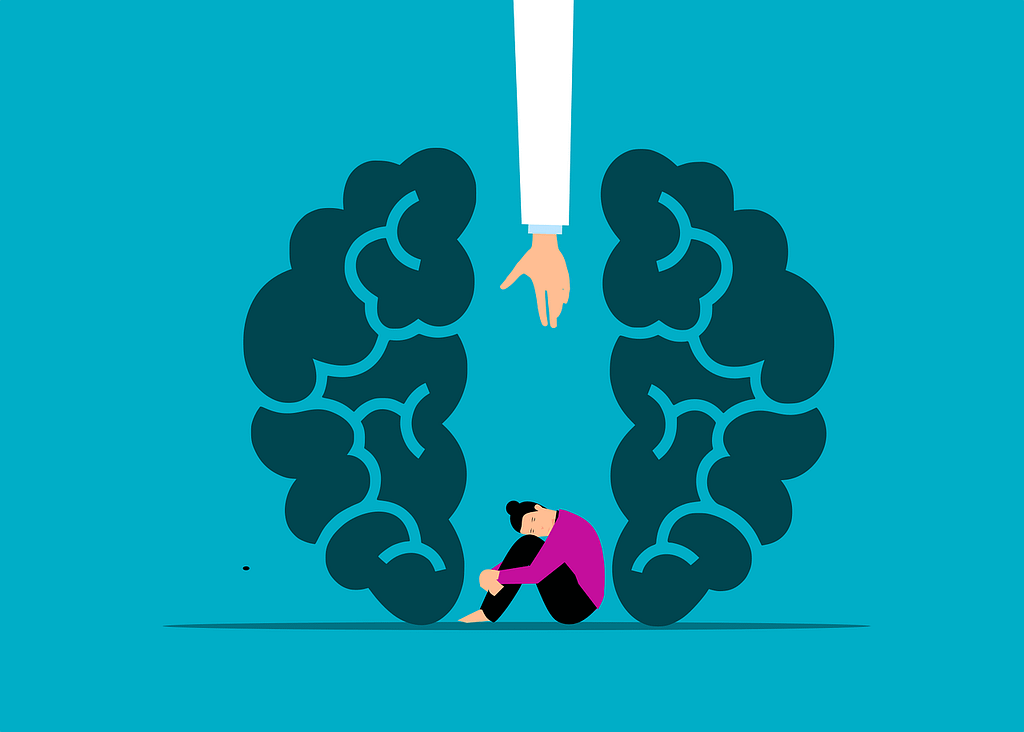The causes of poor mental health are one of the most misunderstood topics of our time—can you guess what’s really behind it?
For starters, over 160 million Americans live in areas with a shortage of professional mental health resources, according to the National Alliance on Mental Illness. Limited access to education and support leaves many struggling in silence.

Adding to the problem is the pervasive stigma surrounding mental health, which causes countless individuals to underestimate its importance—or worse, avoid seeking help for fear of judgment.
And that’s just the beginning. From chronic stress to digital overload, many other contributors to mental health struggles often go unnoticed. Let’s break them down.
1. Lack of self-care
Picture this: you have received a raise at work and bought your dream car, yet still feel a sense of dissatisfaction. No matter your list of accomplishments, you still feel like you are missing something. The causes of your poor mental health are then due to the needs of your mind and body that you have been neglecting for so long.
As humans, we are not machines—we are imperfect beings who require rest and care. Failing to prioritize self-care can lead to burnout, a state of physical, emotional, and mental exhaustion caused by prolonged stress and overwork.

Self-care is crucial because it allows our mind, body, and spirit to recharge from the daily pressures of life, work, school, and other responsibilities. While tackling these responsibilities is much needed, we must remember that our time and energy are limited. The more we neglect self-care, the more our minds and bodies will demand it.
Taking time for self-care also enables us to enjoy the fruits of our labor and immerse ourselves in activities that bring us joy. By intentionally carving out time for our hobbies and passions, we create a balance that brings harmony to our hectic lives.
2. Poor time management
The telltale signs of poor time management include procrastination, arriving late, and missing deadlines. While these habits can hinder our professional success by delivering a negative impression, they can also impact our mental well-being. As our responsibilities pile up, we become overwhelmed, stressed, and anxious at all the to-do’s on our list.

Poor time management does not just affect our productivity—it also impacts our personal lives. Failing to prioritize what matters most may cause us to miss out on meaningful moments, such as spending quality time with a loved one. This imbalance could drain our mental health even more as we feel ourselves losing the things that we care about.
3. Toxic social circle
We may not realize it but the certain people we choose in our lives may be the causes resulting in our poor mental health state. While the people you decide you want in your life can bring you up, they can also bring you down. We may not easily identify it at first, but over time, as we change, so do the people around us. People may change for the better, for the worse, or remain the same as the first time we met them.

Being surrounded by fake friends who bring us down can have a tremendous impact on our mental health, as their negativity gets projected onto us. The constant gossip, backstabbing, and bitterness will gradually drain our well-being, especially the more we immerse ourselves in the group.
4. Desire for more
We all have wants and needs, but how do we differentiate between those that are healthy and those that aren’t? It can be tricky to categorize our desires, yet it’s an enlightening process that helps us recognize how our unnecessary wants negatively impact our mental health.

Finding true peace becomes difficult when we’re consumed by never-ending wants and desires. We’re continually yearning for something, but when we do not have it, we become angry, bitter, and even sad. Our desires cause our emotions to fluctuate, and over time, these emotions may lead to depression, anxiety, and other mental health disorders.
5. Genetics and environmental factors
Sometimes, the root causes of our poor mental health are beyond our control and are due to our genetics. We all have desires and needs, but these may not always be attainable due to genetics and environmental factors that are out of our control.
For example, if we dream of becoming a millionaire but grew up in a financially struggling household, that goal becomes more difficult. Someone already raised in a wealthy family still needs to work hard, but their environment has them set to succeed.
The more desires we have, the more stress and emotional strain we experience when genetic or environmental factors prevent us from achieving them. Setting expectations and goals is fantastic, but obsessing over unrealistic ambitions and refusing to accept the circumstances you were born into can take a toll on your mental well-being.
6. Practice of poor habits
Our mental health challenges may even stem from daily habits we don’t pay much attention to. Poor sleep, skipping exercise, and an unhealthy diet are all habits that can gradually contribute to stress and deteriorate our mental well-being. We may indulge in these poor habits as a coping mechanism against our struggling mental health, but that often causes more harm than good.

Physical and mental health are deeply interconnected, functioning in a cause-and-effect relationship. When one struggles, it directly impacts the other. Neglecting your physical health can take a toll on your mental well-being, and ignoring your mental health can hinder your physical health. The more these unhealthy patterns persist, the more these aspects of your health suffer.
How to Overcome Poor Mental Health
Overcoming poor mental health begins with addressing the causes behind it. It’s important to remember that improving your mental health won’t happen overnight. Just like enhancing physical health requires time, discipline, and patience, the same holds for mental well-being. The first step is often the hardest, but that initial action will eventually snowball into many more positive steps as you progress.
1. Adopt a self-care routine
Self-care involves more than just meeting basic needs like getting enough sleep and eating healthy—it also includes engaging in activities that bring you joy. Whether walking in nature, listening to a podcast, or diving into a good book, these simple acts of self-care can significantly boost your mood.

A significant source of stress in our lives often comes from our daily responsibilities—work, homework, and responsibilities at home. It is essential to address these tasks, but it is equally important to carve out time for self-care. Whether it’s 15 or 30 minutes, making time for self-care keeps you inspired and prevents burnout. However, with busy schedules, finding this time can be challenging, which is why time management is crucial.
2. Plan and schedule your time
Procrastination, arriving late to important meetings, and missing deadlines—these are time management’s worst enemies. We all have 24 hours in a day, and no matter how much we wish we could buy more time, we can only make the most of what we have by managing every minute effectively.

While these habits can hinder our professional success, they also take a significant toll on our mental well-being. The disorganization, frustration, and chaos that come with trying to juggle too many tasks in too little time can lead to stress and anxiety.
To master the art of time management, there are several strategies we can put into practice. Some of these include:
- Prioritize important tasks with earlier due dates and offload non-important ones.
- Schedule your days using a calendar system in advance.
- Practice the 5-minute rule: complete 5 minutes of a task, which encourages your mind to continue working.
- Write everything you need to get done on a list instead of tracking it in your head.
- Eliminate distractions (street noise, people walking by, and notifications) to promote efficiency.
3. Cut out people that bring you down
A 2023 Pew Research Study found that most U.S. adults have between 1 and 4 close friends. If you have more that’s great, but if you have less, that’s also great.
The issue isn’t about the number of close friends we have but the number of “friends” who may not be good for us. The real challenge often lies not in understanding why we need to distance ourselves from them but in finding the strength to let them go.
To help you with this process, consider these tips:
- Communicate your feelings towards them. If they react defiantly, that’s your sign to distance yourself from them.
- Politely decline the invitations they offer you.
- Make yourself less available to them.
- Don’t respond when they attempt to guilt trip you.
4. Understand your desires and limit unnecessary ones
As humans, we experience both necessary and unnecessary desires. Understanding these desires comes through self-reflection—taking the time to identify what we truly want and why we crave them.
Necessary desires could include food, quality sleep, or a fulfilling job. In contrast, unnecessary desires might be things like a luxury car not for transportation but for validation from others.

Understanding your desires and limiting unnecessary desires also comes with learning how to be content with what you have. If you’re striving for more, when will you be happy with enough?
To help identify your unnecessary desires, consider these strategies:
- Ask yourself why you desire these things. Is the external validation? Pressure from friends and family? Is it to fit in with everyone else?
- Identify the things that bring you greater peace and comfort if you remove them.
- Identify the things you put your time and focus towards pursuing but realize you don’t need.
- Recognize the internal and external factors that push you towards these unnecessary cravings.
Some ways to eliminate your unnecessary desires include:
- Reflect on your values and which ones you care more about. What do you value more: financial independence or validation from peers?
- Weigh the pros and cons of your unnecessary desires. Do the costs outweigh the benefits?
- Eliminate or limit social media exposure to posts that may trigger your want for these unnecessary desires.
- Pursue the things that make you happy rather than pursue the things that bring instant gratification.
5. Seek professional help
When your struggling mental health is due to genetics or environmental factors, seeking professional help such as therapy, counseling, or coaching may be incredibly beneficial.
While professional help can sometimes be costly, it offers valuable insights and solutions that may have been difficult to uncover individually. Therapy provides a safe space to understand your emotions and work toward resolving them.
There are various forms of therapy available, some of which may be offered at a discounted rate:
- Traditional therapy: Psychology Today, Therapy Den, Open Path Collective
- Online counseling and virtual therapy services: Better Help, Talkspace, Brightside
- Therapy offered by your college or university.
- Text 988 or chat with 988lifeline.org if you’re experiencing an emergency.
6. Change lifestyle habits
Changing the lifestyle habits you’ve been practicing is easier said than done. Overcoming these habits requires discipline, patience, and a clear sense of purpose behind why you want to make the change. If you don’t have all three, breaking free from old patterns becomes challenging and downright impossible.
There are many strategies to help you overcome poor habits, but they all start with you. You must be willing to take action, keep moving forward, and persevere even when you slip back into old behaviors.
Here are some ways to help you change your old lifestyle habits:
- Take small incremental steps rather than jump immediately into a new change (start by exercising 10 minutes a day and working your way up to an hour a day).
- Track your progress to keep you encouraged and motivated to continue moving forward.
- Reward yourself for your hard work and consistency, whether indulging in a favorite treat or taking a well-deserved nap.
- Visualize the person you would become if you started today and never gave up.
To learn how to adopt a consistent exercise routine, check out this article.
Conclusion
In conclusion, maintaining stable mental health is crucial, as it empowers us to face any challenges life throws our way. Many factors can contribute to the decline of our mental health, including personal choices—such as the people we surround ourselves with or our inability to manage time effectively. Additionally, some causes may be beyond our control, like our genetics or our surrounding environment.

Recognizing when our mental health is unstable can be challenging, but there are strategies we can use to improve it. Many of these strategies involve addressing the root causes of our mental health struggles, such as practicing self-care or gaining a better understanding of our desires. But, there are also an abundance of other strategies to improve your mental health. With patience and commitment, we can work toward achieving better mental well-being.
Do you have a self-care routine? If not, what’s your plan to look after yourself this week?


